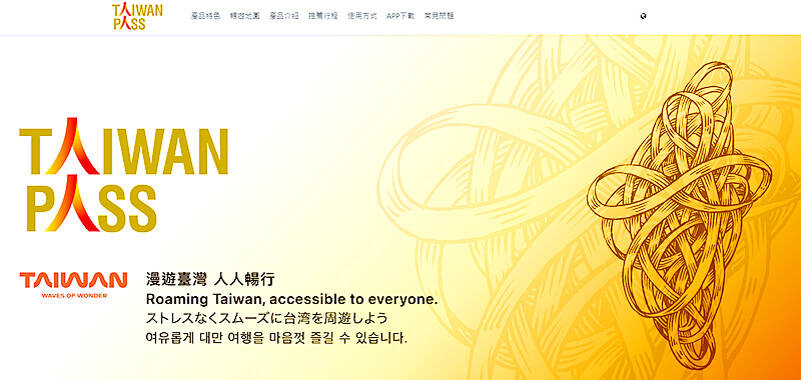The Tourism Administration on Monday launched a limited-time round-the-island travel package called the “Taiwan Pass,” priced at NT$2,800 for two travelers.
The package, which integrates Taiwan Railway Corp services, local metro systems and tourist buses, would be offered through Sept. 30, the agency said.
Under Taiwan Pass, available to both Taiwanese and foreign nationals, passengers can travel an unlimited number of times on Taiwan Railways trains over a five-day period either alone or with a companion.

Photo: Screen grab from the Taiwan Pass Web site
In addition, travelers can select one regional metro travel service to use: a two-day Taipei FunPass, round-trip rides on the Taoyuan Metro, a 48-hour tourist pass for the Taichung Metro, or a two-day pass for the Kaohsiung Metro, which includes the city’s light rail service.
Travelers can also choose round-trip tickets to one of four Taiwan Tourist Shuttle routes: Nantou County’s Cingjing Farm (清境農場) or Sun Moon Lake (日月潭), Chiayi County’s Alishan (阿里山), or scenic areas in the Kenting (墾丁) area of Pingtung County.
The Taiwan Pass must be purchased at designated outlets, Klook or Lion Travel, and be used by Nov. 30, the Tourism Administration said.
Travelers can download the Taiwan Pass mobile phone app and enter the redemption code they receive from the outlets to activate their passes, it said.
However, as the pass aims to aid the economic recovery of eastern Taiwan following a massive earthquake measuring 7.2 on the Richter scale that struck Hualien County on April 3, passengers would be required, when redeeming their Taiwan Railways service, to reserve a trip anywhere between Toucheng (頭城) and Dawu (大武) stations on the Eastern Line.
Those railway trips can be booked through the Taiwan Pass App at one of 18 designated train stations, it said.
For more information, go to https://twpass.tw.

Three Taiwanese airlines have prohibited passengers from packing Bluetooth earbuds and their charger cases in checked luggage. EVA Air and Uni Air said that Bluetooth earbuds and charger cases are categorized as portable electronic devices, which should be switched off if they are placed in checked luggage based on international aviation safety regulations. They must not be in standby or sleep mode. However, as charging would continue when earbuds are placed in the charger cases, which would contravene international aviation regulations, their cases must be carried as hand luggage, they said. Tigerair Taiwan said that earbud charger cases are equipped

Foreign travelers entering Taiwan on a short layover via Taiwan Taoyuan International Airport are receiving NT$600 gift vouchers from yesterday, the Tourism Administration said, adding that it hopes the incentive would boost tourism consumption at the airport. The program, which allows travelers holding non-Taiwan passports who enter the country during a layover of up to 24 hours to claim a voucher, aims to promote attractions at the airport, the agency said in a statement on Friday. To participate, travelers must sign up on the campaign Web site, the agency said. They can then present their passport and boarding pass for their connecting international

Temperatures in northern Taiwan are forecast to reach as high as 30°C today, as an ongoing northeasterly seasonal wind system weakens, the Central Weather Administration (CWA) said. CWA forecaster Tseng Chao-cheng (曾昭誠) said yesterday that with the seasonal wind system weakening, warmer easterly winds would boost the temperature today. Daytime temperatures in northern Taiwan and Yilan County are expected to range from 28°C to 30°C today, up about 3°C from yesterday, Tseng said. According to the CWA, temperature highs in central and southern Taiwan could stay stable. However, the weather is expected to turn cooler starting tonight as the northeasterly wind system strengthens again

Taiwan sweltered through its hottest October on record, the Central Weather Administration (CWA) said yesterday, the latest in a string of global temperature records. The main island endured its highest average temperature since 1950, CWA forecaster Liu Pei-teng said. Temperatures the world over have soared in recent years as human-induced climate change contributes to ever more erratic weather patterns. Taiwan’s average temperature was 27.381°C as of Thursday, Liu said. Liu said the average could slip 0.1°C by the end of yesterday, but it would still be higher than the previous record of 27.009°C in 2016. "The temperature only started lowering around Oct. 18 or 19